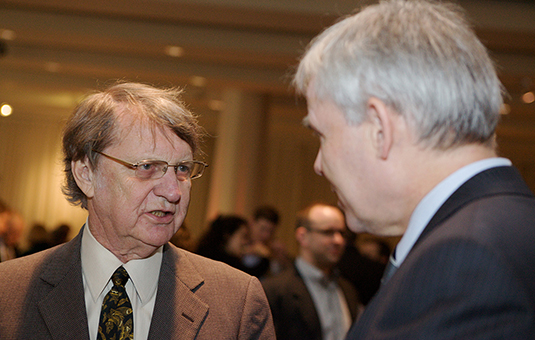Mission
The Jeanne X. Kasperson Research Library is dedicated to higher learning and to supporting those who seek to expand their knowledge. The primary mission of the library is to support Clark University’s extensive environmental research programs. This includes but is not limited to programs conducted under the aegis of the George Perkins Marsh Research Institute, the Graduate School of Geography, and the Department of Sustainability and Social Justice (formerly IDCE). The library is committed to serving the educational functions of the University and the broader community in order to further research related to sustainability and global environmental change, international development, and risk and hazards to society and the environment.
In Memory of Dr. Roger Kasperson ’59
Clark University is saddened by the passing of Dr. Roger Kasperson ’59, longtime professor of geography, former provost, former director of the George Perkins Marsh Institute, and member of the National Academy of Sciences. Memorial donations may be made to the Jeanne X. Kasperson Library Endowed Fund.
Collections
The Kasperson Research Library offers one of the most extensive collections in North America on environmental risk and hazards, environment and development, and the human dimensions of global environmental change. The library’s collection also includes holdings in international development, water resources, technology, energy policy, and sustainability. Over 35,000 books, technical reports, and government documents make up the current catalogued collection. The library receives journals and newsletters related to its focus areas. In addition, the library maintains an expansive internal database of grey literature in its areas of specialization, a collection of over 300 data boxes covering a wide range of topics from AIDS to water pollution, and an extensive collection of holdings on radioactive waste management issues.
Special collections include the Worcester Refugee Archive, a repository for materials and resources related to Worcester’s refugee and forced migrant communities. The collection includes published and unpublished materials on the history, resettlement, community health, livelihoods and material culture of individuals, groups, refugee community organizations, and agencies based in and around Worcester.
Services
- Borrowing policy: Students may borrow books for 28 days with options to renew if the book is not in demand.
- Personalized research assistance
- Reference help
- Comfortable space for individual study or small group projects
- Library orientation tours/classes for incoming and current students
- Coordination of class assignments around Kasperson Library resources
- Compilation of materials for classes
- Copying/printing/scanning
New Acquisitions
NEW BOOKS AT KASPERSON LIBRARY 2022
Global im-possibilities: Exploring the paradoxes of just sustainabilities edited by Phoebe Godfrey and Mary Buchanan (2021)
Transformative pathways to sustainability: Learning across disciplines, culture and contexts produced by the Pathways Network (2022)
Capitalism and the commons: Just commons in the era of multiple crises edited by Andreas Exner, Sarah Kumnig, and Stephen Hochleitner (2021)
Inequality in a context of climate crisis after COVID: A complex realist approach by David Byrne (2021)
Planetary specters: Race, migration, and climate change in the twenty-first century by Neel Ahuja (2021)
Climate change is racist: Race, privilege and the struggle for climate justice by Jeremy Williams (2021)
Environmental justice in the Anthropocene: From (un)just presents to just futures edited by Stacia Ryder…et al. (2021)
Diversity and inclusion in environmentalism edited by Karen Bell (2021)
The green city and social justice: 21 tales from North America and Europe edited by Isabelle Anguelovski and James J.T. Connolly (2022)
Gentrification down the shore by Molly Vollman Makris and Mary Gatta (2021)
Pushed out: Contested development and rural gentrification in the US West by Ryanne Pilgeram (2021)
Living Detroit: Environmental activism in an age of urban crisis by Brandon M. Ward (2022)
Gray to green communities: A call to action on the housing and climate crises by Dana L. Bourland (2021)
Just Housing: The moral foundations of American housing policy by Casey J. Dawkins (2021)
A city is not a computer: Other urban intelligences by Shannon Mattern (2021)
The $16 taco: Contested geographies of food, ethnicity, and gentrification by Pascale Joassart-Marcelli (2021)
Resourcing an agroecological urbanism: Political, transformational and territorial dimensions edited by Chiara Tornaghi and Michiel Dehaene (2021)
Food security in the High North: Contemporary challenges across the circumpolar region edited by Kamrul Hossain, Lena Maria Nilsson, and Thora Martina Herrmann (2021)
Russia’s food revolution: The transformation of the food system by Stephen K. Wegren (2021)
The ninth revolution: Transforming food systems for good by Sayed Nader Azam-Ali (2021)
True cost accounting for food: Balancing the scale edited by Barbara Gemmill-Herren, Lauren E. Baker and Paula A. Daniels (2021)
Thinking through climate change: A philosophy of energy in the Anthropocene by Adam Briggle (2021)
Oil spaces: Exploring the global petroleumscape edited by Carola Hein (2022)
Electric mountains: Climate, power, and justice in an energy transition by Shaun A. Golding (2021)
100% clean, renewable energy and storage for everything by Mark Z. Jacobson (2021)
Who owns the wind?: Climate crisis and the hope of renewable energy by David McDermott Hughes (2021)
The resistance dilemma: Place-based movements and the climate crisis by Gregory Hoberg (2021)
Socio-legal struggles for indigenous self-determination in Latin America: Reimagining the nation, reinventing the state by Roger Merino (2021))
Indigenous peoples rise up: The global ascendency of social media activism edited by Bronwyn Carlson and Jeff Berglund (2021)
Resisting extractivism: Peruvian gold, everyday violence, and the politics of attention by Michael Wilson Becerril (2021)
Extracting accountability: Engineers and corporate social responsibility by Jessica M. Smith (2021)
Mapping abundance for a planetary future: Kanaka Maoli and critical settler cartographies in Hawai’i by Candace Fujikane (2021)
Unwritten rule: State-making through land reform in Cambodia by Alice Beban (2021)
Land fictions: The commodification of land in city and country edited by D. Asher Ghertner and Robert W. Lake (2021)
An elusive common: Land, politics and agrarian rurality in a Moroccan Oasis by Karen E. Rignall (2021)
The transnational land rush in Africa: A decade after the spike by Logan Cochrane and Nathan Andrews (2021)
Agrarian capitalism, war and peace in Colombia: Beyond dispossession by Jacobo Grajales (2021)
Plantation life: Corporate occupation in Indonesia’s oil palm zone by Tania Murray Li and Pujo Semedi (2021)
Threatening dystopias: The global politics of climate change adaptation in Bangladesh by Kasis Paprocki (2021)
Reimagining the Gran Chaco: Identities, politics, and the environment in South America edited by Silvia Hirsch, Paola Canova, and Mercedes Biocca (2021)
Land, the state, and war: Property institutions and political order in Afghanistan by Jennifer Brick Murtazashvili and Ilia Murtazashvili (2021)
Border women and the community of Maclovio Rojas: Autonomy in spaces of neoliberal neglect by Michelle Tellez (2021)
Refugees states: Critical refugee studies in Canada edited by Vinh Nguyen and Thy Phu (2021)
Urban resettlements in the Global South: Lived experiences of housing and infrastructure between displacement and relocation edited by Raffael Beier, Amandine Spire and Marie Bridonneau (2021)
What’s the worst that could happen?: Existential risk and extreme politics by Andrew Leigh (2021)
The invention of disaster: Power and knowledge in discourses on hazard and vulnerability by JC Gaillard (2022)
Unnatural disasters: Why most responses to risk and climate change fail but some succeed by Gonzalo Lizarralde (2021)
Critical disaster studies edited by Jacob A.C. Remes and Andy Horowitz (2021)
Split waters: The idea of water conflicts edited by Luisa Cortesi and K.J.Joy (2021)
Gonna trouble the water: Ecojustice, water, and environmental racism edited by Miguel A. De La Torre (2021)
Underwater: Loss, flood insurance, and the moral economy of climate change in the United States by Rebecca Elliot (2021)
The creeks will rise: People coexisting with floods by William S. Becker (2021)
A blueprint for coastal adaptation: Uniting design, economics, and policy edited by Carolyn Kousky, Billy Fleming, and Alan M. Berger (2021)
Jeanne X. Kasperson earned a master’s degree in English from The University of Chicago in 1962 and a master’s degree in library science from Simmons College in 1967. After working in academic libraries at The University of Chicago, the University of Connecticut, and Michigan State University, she joined Clark in 1977 as a research Librarian for the Hazard Assessment Group and subsequently served as Research librarian for the University’s Center for Technology, Environment, and Development, and later the George Perkins Marsh Library. For the years 2000-2002, Professor Kasperson was on leave from Clark with her husband and Clark Professor Roger Kasperson, conducting research at the Stockholm Environment Institute in Sweden.
Throughout her career, Professor Kasperson was also an active researcher, pursuing scholarly interests in the general areas of risk analysis and global environmental change. In 1993, she was promoted to research associate professor in Clark’s George Perkins Marsh Institute. She was the author of more than 80 articles, books and technical reports, editor of several journals and recipient of many research grants. She is also recognized by her colleagues as a key contributor to much of the research undertaken by the George Perkins Marsh Institute. She was co-editor of the Nature and Society section of the Annals of the Association of American Geographers with Roger Kasperson. Professor Kasperson was particularly fond of words and tracking down information that others believed could not be found, leading some colleagues to believe that when she walked through the library “books talked to her.”
Jeanne X. Kasperson was a key member of a highly productive research group at Clark University, first at the Center for Technology, Environment, and Development (CENTED) and later in its successor the George Perkins Marsh Institute. This group worked primarily on risk and hazard issues and later on global environmental change. Jeanne’s role was a combination of researcher, bibliographer, and repository of deep knowledge on the relevant literature, and writer and editor.
Her publications have a prominent place in risk/hazards and global change research. Her early research with other group members focused on hazards theory and methodology, substantially extending the earlier natural hazards paradigm. “Perilous Progress: Managing the Hazards of Technology,” published in 1985, summarized theoretical work and case study applications. Subsequent assessments with Robert Kates profiled the state of hazards research in the mid-1980s. In the latter part of the same decade, she co-authored a series of works addressing the “social amplification of risk,” an integrated analytic approach addressing how society processes and responds to the flow of hazards and hazard events. During the 1990s, she collaborated with Roger Kasperson and Bill Turner on a comparative study of nine environmentally endangered regions around the world, resulting in “Regions at Risk: Comparisons of Threatened Environments,” published in 1995, and a series of related regional monographs published over the next five years. In 2001, she and Roger Kasperson published “Global Environmental Risk,” a work exploring the use of risk analysis to understand global environmental change. A work is currently in preparation collecting significant work of Jeanne and her husband Roger, which will be published in 2003 by Earthscan Press.


